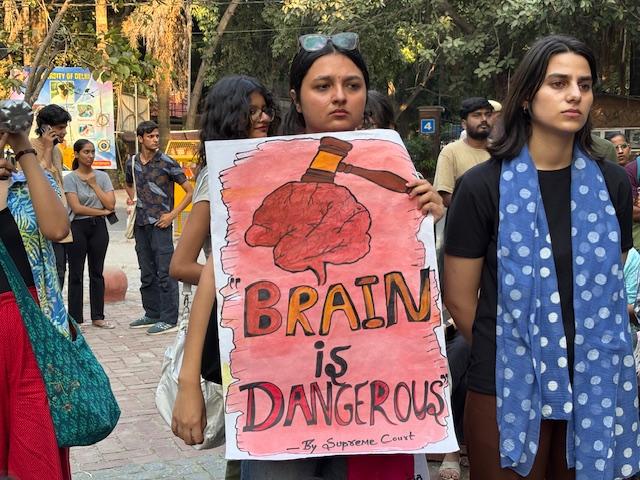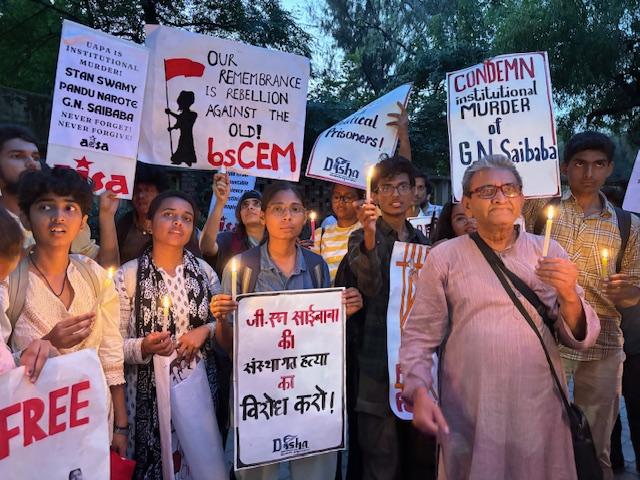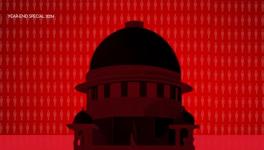Delhi University: Hundreds of Students, Teachers Mourn Saibaba’s Death at the ‘Hands of the System’

Students and teachers at a gathering in Delhi University to pay homage to Prof G N Saibaba, who died on October 10, 2024, after serving 10 years in jail on trumped up charges. (Image Credit: Ravi Kaushal)
New Delhi: It’s was a mournful and emotional evening for hundreds of students and teachers of Delhi University who gathered on Tuesday at the Arts Faculty in the North Campus to remember their beloved colleague G N Saibaba, who died on October 12, at Nizam’s Institute of Medical Sciences Hospital in Hyderabad.
Saibaba, who taught in Ram Lal Anand College till 2014, was released on March 7 this year after the Bombay High Court acquitted him of charges under the Unlawful Activities Prevention Act (UAPA). The court found procedural lapses in the grant of sanction by the Maharashtra and the Central governments. It took 10 years for Saibaba, a person with 90% disability, to walk out of prison.
At the gathering for Saibaba’s remembrance, the protesters maintained that his health deteriorated after he was denied basic necessities by the jail authorities.
Raising slogans like’ UAPA Down Down’, ‘Authoritarianism Down Down’, a group of students sang songs like “Lal Jhanda lekar comrade” and pledged to continue the struggle for a just campus and society.
Saavy, a third-year student at the Faculty of Law University told NewsClick that would always remember Saibaba for his contribution to struggles for social justice.
“When I joined the Ram Lal Anand College, he was in the jail. However, when his services were discontinued, I came to know about him. He was said to be a passionate teacher, so much so that he dreamed about teaching students inside the jail, too. Yet, many like him are languishing in jails in fabricated cases registered under draconian laws like UAPA and NSA (National Security Act). They should be released and these laws must be revoked,” she said.
When asked how she, as a budding lawyer, sees the delay in justice (for the late professor), Savvy said, “It is concerning and unfortunate. It’s State-sponsored murder facilitated by the judiciary. It takes years to even start a trial in cases of UAPA and NSA. Even after Saibaba was acquitted by the first bench, the Maharashtra government approached the Supreme Court, heard the matter on Saturday which is otherwise a public holiday and stayed the acquittal. How can an institution, which is defender of our rights, curb the rights of a person who fought for the voiceless?”
Among the mourners, Lipi, a student of B Sc (Honours) Physics in Miranda House, held a poster stating ‘Brain is Dangerous’. When asked about it, she said Saibaba provided a critical lens to his students to observe things and happenings in the society.
“It was seen as a dangerous thing to do particularly, when there is an assault on our education and secular values. If we look at the case, 29 out of 30 witnesses were policemen. What kind of a case was it?” she asked.
Karen Gabriel, who teaches at St. Stephens College, University of Delhi, said that she knew Saibaba from the days he had joined the campus.
“I had known Saibaba as a friend, teacher and a comrade. He was a courageous man with immense clarity. Today, when they raid and arrest people, they term them as “urban naxal”. I think it is time to reflect on who is an ‘urban naxal’. It appears that it refers to people who have understood the logic of the unjust system and want to dismantle it. When Sai came, he did not have a wheelchair. He used to move on his arms. If you look at his older pictures, you will find that he had a stronger upper body. When he came out of jail, his arms did not properly function,” she added.
Gabriel, who was also part of the G N Saibaba Defence Committee, said, “When the raid at his Gwyer Hall residence took place, we were present and noted how carelessly the policemen put his digital devices and other papers in polythene bags. They did not seal them. They forced a local barber to sign a paper. Sai was not allowed to use a toilet for 48 hours. They dragged him by his left arm. Later, he could not raise it. From a 90% disabled man, he became more disabled. He was actually made disabled by the State and its agencies.”
The professor said Saibaba’s death was a wake-up call for common citizens. If the state can incarcerate a person with 90% disability without embarrassment and successfully convict and imprison him, then it is the sign of the confidence of the State to trample upon common citizens, she said.
It may be recalled that Saibaba was arrested during the last year of Congress-led United Progressive Alliance rule. “Governments and the ruling elite have their own interests. Then there are people like us who want to reclaim our spaces. Fight to take back the space to live with dignity and most importantly freedom. I think the biggest message that we can get from Sai’s life is to keep up the fight,” Gabriel added.
Sachin N, Associate Professor, Dyal Singh College, said teachers and students wanted to hold the memorial meeting inside an institutional space in the campus. “However, we were denied space. We were not even allowed beyond main Arts Faculty gate,” he said.
“Why did this happen? Because there is an insidious system that we nurture with our indifference. It was this indifference that Sai tried to fight. If we look at his poems and letters, we find that it is the pretence of the system that failed him. It was the pretence of the judges who looked indifferent to the struggles of people when they approach higher benches of the judiciary. Even when he was acquitted of all charges, the Supreme Court ordered a different bench to re-hear the case and put him under incarceration for one more year. Finally, he moved out of jail and addressed a meeting here (in Delhi). In an exception, we saw an emotional Sai when he remembered his mother. He was denied bail even when his mother was on her death bed. He was denied water to clean himself in the toilet. Yet, judges after judges denied him basic humanity. The system is the enemy of the people,” he told NewsClick.

Vikas Gupta, Professor, Department of History, DU, said it was commonly believed that the system works better when the most marginalised person becomes the frontrunner in any field.
“Saibaba exactly represented that. He overcame every hurdle to a be teacher at Delhi University and raised his voice for the voiceless. Perhaps, the people who arrested him saw this as a threat and put him behind bars,” he said.
Gupta added, “In 2013, we received a complaint from Saibaba that he was facing a problem regarding accommodation. I rang Prof Agnihotri who was heading Equal Opportunity Cell and forwarded his application to the Vice-Chancellor. Meanwhile, the police had raided his house. One day, I got a call a from the Office of the Commissioner for Rights of the Persons with Disabilities. He wanted to know about the status of the complaint. I apprised him about the situation that it’s a genuine case and he must be provided house.”
“However, the commissioner said that the Vice Chancellor’s impression about Saibaba is of a Maoist sympathiser. I questioned him if the Constitution determines our rights based on our ideology. Till this time, the commissioner had become a system’s man. A person who was in the drafting committee of United Nations Convention on Rights of the disabled declined to help him because Saibaba was not part of the system.”
Gupta said what stood out about Saibaba was his commitment to fight against any form of injustice. “If you are part of any kind of social justice struggle, then it becomes natural to oppose other inequalities,” he added.
Abha Dev Habib, Associate Professor, Miranda House, said Tuesday’s gathering was not only a condolence meeting but a display of collective anguish.
“We are anguished because Saibaba is not amongst us. We are equally anguished at the wrongful incarceration of Umar Khalid and Prof Hany Babu. Had they been godmen, they would have got the parole on regular intervals. Saibaba represented hope. In 2014, we had conducted a candlelight protest at India Gate against imposition of Four-Year Undergraduate Programme. He knew that there would be hundreds of policemen and they may lathi-charge too. Yet, Sai came on his wheelchair. It is a time to revisit the values that corporate-communal nexus want to impose. Perhaps, the new generation will take the fight ahead that Saibaba left behind.”
Get the latest reports & analysis with people's perspective on Protests, movements & deep analytical videos, discussions of the current affairs in your Telegram app. Subscribe to NewsClick's Telegram channel & get Real-Time updates on stories, as they get published on our website.
























